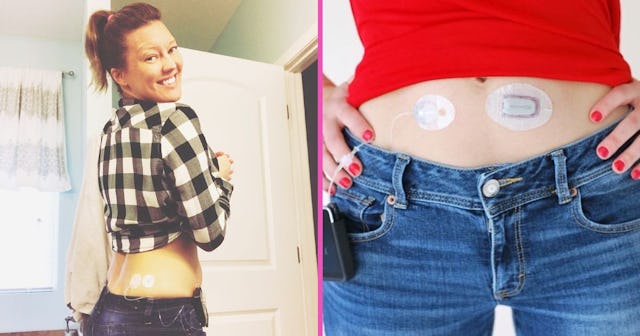I Look Young and Healthy, But I'm Among COVID-19's Vulnerable Populations

I look like your everyday mom. I wear my hair in a gradually declining topknot, drive a minivan, and drink too much coffee. I think I’m raising the best four children in the world, but I’m not above yelling at them across the house or yard. I squeeze in exercise almost every day and try to eat healthy. Someone who sees me would have no clue that I have a chronic autoimmune disease, because type 1 diabetes is considered an invisible illness—undetectable by the naked eye.
I am considered one of the vulnerable populations that you’ve been warned about since the coronavirus became a global pandemic, resulting in multiple states issuing a shelter-in-place mandate and social isolation and distancing recommendations. Those like me who have underlying medical conditions and the elderly are considered higher risk. I’m begging everyone I know to please, please take the social isolation guidelines seriously.
RELATED: 10 Exercise Routines For Seniors That Improve Strength And Balance
Over the fourteen-year course of being a type 1 diabetic, I’ve been told more times than I can count that I do not “look sick.” Those with invisible illnesses are used to hearing this; however, it’s still stings. How am I supposed to look, exactly? Being judged based on my appearance is exhausting and dehumanizing. In fact, it’s downright discriminatory.
Just because I don’t “look sick” doesn’t mean I’m not. I do not consider myself ill every single moment of every single day. But I certainly believe that I have special needs. I carry a huge purse that’s half full of medical supplies, including all the pieces I need to change my insulin pump set and emergency quick-sugar snacks. I wear a medical identification bracelet in case I pass out from low blood sugar or am in a situation where I’m unable to communicate my diagnosis to emergency responders. I don’t travel lightly. To do so would be irresponsible.
When you see me, you wouldn’t spot my insulin pump, which is always clipped to my waistband or sports bra, unless you were really looking for it. Under my shirt is a tube that stretches from my pump to a cannula that delivers insulin into my body. I also wear a continuous glucose monitor, a separate device that’s inserted through my skin on my abdomen and sends my blood sugar numbers to my insulin pump and cell phone. These devices work together to keep me healthy and alive.
So what’s the big deal with me and COVID-19? In order for type 1 diabetes to be well controlled, everything has to work together efficiently. Certain factors can raise or lower my blood sugar to dangerous numbers. Stress, dehydration, heat — and, you guessed it, illness — can raise my blood sugar and make it very difficult to manage. If my blood sugar is too high for too long, I can start spilling ketones and go into a deadly state called Diabetic Ketoacidosis. DKA is a medical emergency. High blood sugars also lower immunity, making a person like me more susceptible to the coronavirus.
Maintaining a perfect balance is almost impossible. Diabetes can be unpredictable, even when the patient is someone experienced like I am and has all the most advanced tools at my disposal. One of the scariest things that can happen is unprecedented illness, which can put me on a blood sugar roller coaster, making it much more difficult to fight a virus and recover from it.
When I see people not adhering to social distancing, social isolation, and shelter-in-place recommendations, it’s infuriating. There’s always been a disregard for the elderly and for people with disabilities. Healthy people often take their wellness for granted. I’ve had people tell me that I must have become a type 1 diabetic because I ate too much sugar (which is completely untrue). They want to lay blame on the victim.
It’s downright selfish to blatantly ignore recommendations or half-ass it right now. Every person deserves protection from the virus, not just the youngest and healthiest humans. None of us should have our life-value judged based on how we present. Any loss of life is tragic.
Furthermore, many people have mistakenly assumed that just because someone is young and healthy, they are immune from COVID-19. However, the current reality has clearly proven them wrong. Yes, there appear to be higher risk populations, but there are also younger and healthier people who are being diagnosed. A person with coronavirus doesn’t present in one way. This isn’t a one-size-fits-all situation.
What I want others to know is that all of us need to take the COVID-19 battle seriously and do our part. I’m absolutely terrified that a stranger, one who is unknowingly carrying the virus, will abruptly assume, once again, that I’m young and healthy, and expose my family. We are practicing social isolation, but we cannot control everyone else—those in the store, those delivering packages to our porch, those out for an afternoon walk past our home.
Please, don’t judge a book by its cover. Follow the guidelines at all times. The only way we will get through this pandemic nightmare is together.
This article was originally published on